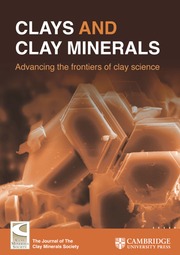Crossref Citations
This article has been cited by the following publications. This list is generated based on data provided by
Crossref.
Yuan, Hongji
and
Bish, David L.
2010.
Automated Fitting of X-Ray Powder Diffraction Patterns from Interstratified Phyllosilicates.
Clays and Clay Minerals,
Vol. 58,
Issue. 6,
p.
727.
Neumann, Reiner
Costa, Gabriel Ericson Lima
Gaspar, José Carlos
Palmieri, Matheus
and
Silva, Sergio Eduardo e
2011.
The mineral phase quantification of vermiculite and interstratified clay minerals-containing ores by X-ray diffraction and Rietveld method after K cation exchange.
Minerals Engineering,
Vol. 24,
Issue. 12,
p.
1323.
Guggenheim, Stephen
2011.
Layered Mineral Structures and their Application in Advanced
Technologies.
p.
73.
Warr, Laurence N.
and
Grathoff, Georg H.
2012.
Handbook of Particle Detection and Imaging.
p.
667.
Ufer, Kristian
Kleeberg, Reinhard
Bergmann, Jörg
and
Dohrmann, Reiner
2012.
Rietveld Refinement of Disordered Illite-Smectite Mixed-Layer Structures by a Recursive Algorithm. I: One-Dimensional Patterns.
Clays and Clay Minerals,
Vol. 60,
Issue. 5,
p.
507.
Ehlmann, B. L.
Bish, D. L.
Ruff, S. W.
and
Mustard, J. F.
2012.
Mineralogy and chemistry of altered Icelandic basalts: Application to clay mineral detection and understanding aqueous environments on Mars.
Journal of Geophysical Research: Planets,
Vol. 117,
Issue. E11,
Holmboe, Michael
Wold, Susanna
and
Jonsson, Mats
2012.
Porosity investigation of compacted bentonite using XRD profile modeling.
Journal of Contaminant Hydrology,
Vol. 128,
Issue. 1-4,
p.
19.
Sakharov, B.A.
and
Lanson, B.
2013.
Handbook of Clay Science.
Vol. 5,
Issue. ,
p.
51.
Zheng, Yong
Kong, Ping
and
Fu, Bihong
2014.
Time constraints on the emplacement of klippen in the Longmen Shan thrust belt and tectonic implications.
Tectonophysics,
Vol. 634,
Issue. ,
p.
44.
Dumon, M.
and
Van Ranst, E.
2016.
PyXRD v0.6.7: a free and open-source program to quantify disordered phyllosilicates using multi-specimen X-ray diffraction profile fitting.
Geoscientific Model Development,
Vol. 9,
Issue. 1,
p.
41.
Kopačková, Veronika
and
Koucká, Lucie
2017.
Integration of Absorption Feature Information from Visible to Longwave Infrared Spectral Ranges for Mineral Mapping.
Remote Sensing,
Vol. 9,
Issue. 10,
p.
1006.
Austin, Jason C.
Perry, Amelia
Richter, Daniel D.
and
Schroeder, Paul A.
2018.
Modifications of 2:1 Clay Minerals in a Kaolinite-Dominated Ultisol under Changing Land-Use Regimes.
Clays and Clay Minerals,
Vol. 66,
Issue. 1,
p.
61.
Mercier, Patrick H.J.
Omotoso, Oladipo
and
Hockley, Daryl
2018.
Introduction to Oil Sands Clays.
p.
9.
Yuan, Hongji
and
Bish, David L.
2019.
Improved Matrix Methodology for Calculating Diffraction Intensity Profiles from Interstratified Phyllosilicates.
Clays and Clay Minerals,
Vol. 67,
Issue. 5,
p.
399.
Underwood, M.B.
Lawler, N.
and
and McNamara, K.
2020.
Hikurangi Subduction Margin Coring, Logging, and Observatories.
Vol. 372B/375,
Issue. ,
Warr, Laurence N.
and
Grathoff, Georg H.
2020.
Handbook of Particle Detection and Imaging.
p.
1.
Austin, Jason C.
Richter, Daniel D.
and
Schroeder, Paul A.
2020.
Quantification of Mixed-Layer Clays in Multiple Saturation States Using NEWMOD2: Implications for the Potassium Uplift Hypothesis in the SE United States.
Clays and Clay Minerals,
Vol. 68,
Issue. 1,
p.
67.
Warr, Laurence N.
and
Grathoff, Georg H.
2021.
Handbook of Particle Detection and Imaging.
p.
945.
Schaffer, C.R.
Cravotta, C.A.
Capo, R.C.
Hedin, B.C.
Vesper, D.J.
and
Stewart, B.W.
2024.
Multi-decadal geochemical evolution of drainage from underground coal mines in the Appalachian basin, USA.
Science of The Total Environment,
Vol. 947,
Issue. ,
p.
174681.
Bastida, Joaquín
and
Pardo-Ibañez, Pablo
2024.
Applications of X-ray Powder Diffraction Microstructural Analysis in Applied Clay Mineralogy.
Minerals,
Vol. 14,
Issue. 6,
p.
584.

